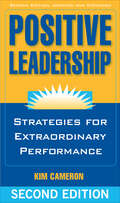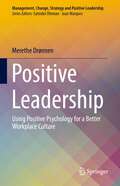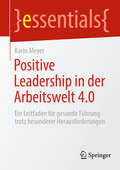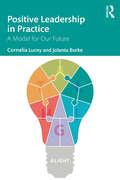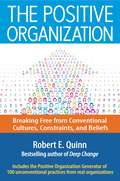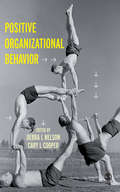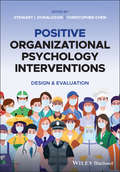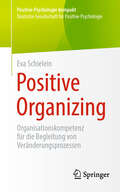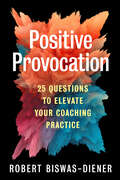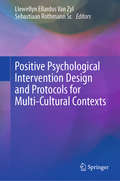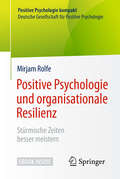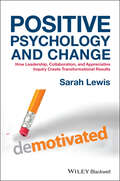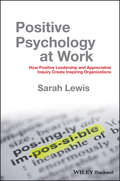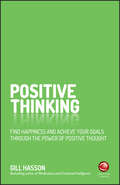- Table View
- List View
Positive Leadership: Strategies for Extraordinary Performance
by Kim CameronUpdated Edition: &“Translates years of social science research into actionable guidelines for leaders who wish to make a positive difference in the world.&” —Amy C. Edmondson, Novartis Professor of Leadership and Management, Harvard Business SchoolPositive Leadership shows how to reach beyond ordinary success to achieve extraordinary effectiveness, spectacular results, and what Kim Cameron calls &“positively deviant performance&”—performance far above the norm. Citing a wide range of research in organizational behavior, medical science, and psychology as well as real-world examples, Cameron shows that to achieve exceptional success, leaders must emphasize strengths rather than simply focus on weaknesses; foster virtuous actions such as compassion, gratitude, and forgiveness; encourage contribution goals in addition to achievement goals; and enable meaningfulness in work. In this concise, inspiring, and practical guide, Cameron describes four positive leadership strategies, lays out a proven process for implementing them, and includes a self-assessment instrument. This second edition has been updated throughout with new research findings and new ideas for implementing positive leadership.
Positive Leadership: Using Positive Psychology for a Better Workplace Culture (Management, Change, Strategy and Positive Leadership)
by Merethe DrønnenThis book demonstrates how leaders can use research from positive psychology to increase work engagement and wellbeing, improve relationships, and increase performance and productivity in the workplace. Specifically, it teaches leaders how to use psychology to understand their own contributions to their leadership style as well as to understand how their employees are being motivated to increase their engagement and productivity. Suitable for leaders, human resource personnel, consultants and coaches, this book gives research-based theory and insight into how leaders’ own attitudes, mind-sets and authenticity are influencing their employees level of performance, emotions and creativity. Readers learn how to motivate, bring meaning into the workplace, improve communication and relationships as well as how to use strength-based leadership. The book features examples from successful companies like Microsoft, Google and Disney and provides practical interventions and techniques in every chapter that can immediately be implemented into the workplace.
Positive Leadership in der Arbeitswelt 4.0: Ein Leitfaden für gesunde Führung trotz besonderer Herausforderungen (essentials)
by Karin Meyer„Immer mehr, schneller und mit möglichst geringen Ressourcen“ lautet oftmals die Devise in der Arbeitswelt 4.0. Dabei ist es möglich, Unternehmens- und Mitarbeiterinteressen bestmöglich zu vereinen – also, Unternehmen (noch) erfolgreicher zu machen und gleichzeitig Wohlbefinden und Gesundheit der Mitarbeitenden zu stärken. Denn ökonomisches und soziales Wohlergehen können sich sinnvoll komplementär ergänzen. Beleuchtet werden daher wesentliche Grundlagen für Wohlbefinden, Gesundheit und unternehmerischen Erfolg – ebenso wie die Umsetzung in die Praxis mittels Positive Leadership gelingen kann.
Positive Leadership in Practice: A Model for Our Future
by Cornelia Lucey Jolanta BurkeThis book aims to help leaders become the best versions of themselves, achieve extraordinary results, and help their team accomplish the same. Packed with research and practical advice from real-life positive leaders, it offers an extensive look into both what high-performance leadership is and how it can be achieved. Positive Leadership in Practice is a resource that all leaders can tap into to be more effective. The book introduces an ALIGHT model that guides leaders through six fundamental resources that can alight their own and their team’s motivation and transform their performance to an extraordinary level. Further breaking down the six resources into 18 core components, the book expands on what constitutes the six resources to make them tangible and accessible. The book also offers leaders the opportunity to self-assess their own levels of resources and levels of positive leadership through a questionnaire, as well as opportunities to reflect on how to further develop these levels of resources and positive leadership. Finally, the book signposts practical strategies to tap into on the back of their reflections to take action to become their best possible positive leader. This book is for existing and aspiring managers, leaders, and those with people-related roles such as in human resources, coaching, leadership development, and organisational consultants, as well as anyone in more informal leadership positions. After all, we are all leaders.
Positive Mental Health for School Leaders (Positive Mental Health)
by Samuel Stones Jonathan GlazzardThe mental health of school leaders and managers is just as important as the well-being of those they teach and support. Recent research reveals some alarming statistics, including that 56% of senior leaders have experienced mental ill health in the last year. This book examines a range of relevant issues including workload, inspections, partnerships and approaches to leadership and management in order to address some of these concerns and provide comprehensive guidance and workable, evidence-informed strategies to support those with leadership roles in schools and colleges.
The Positive Organization
by Robert E. QuinnBeholden to accepted assumptions about people and organizations, too many enterprises waste human potential. Robert Quinn shows how to defy convention and create organizations where people feel fully engaged and continually rewarded, where both individually and collectively they flourish and exceed expectations. The problem is that leaders are following a negative and constraining "mental map" that insists organizations must be rigid top-down hierarchies and that the people in them are driven mainly by self-interest and fear. Quinn offers a more positive mental map and, using dozens of memorable stories, shows how leaders can facilitate the emergence of a more positive organizational culture by helping people gain a sense of purpose, engage in authentic conversations, see new possibilities, and sacrifice for the common good. The book includes the Positive Organization Generator, a tool that enables leaders to identify and implement the positive practices their organization most needs. At its heart, Quinn's book helps leaders transform organizations by changing themselves and those around them from being comfort-centered to being results-centered, from being self-focused to being other-focused, and from being hidebound and suspicious to being eagerly welcoming of new ideas.
Positive Organizational Behavior
by Cary L. Cooper Debra NelsonPositive Organizational Behaviour is emerging as a truly contemporary movement within the classic discipline of organizational behaviour. The best work of leading scholars is gathered together in one edited collection. Chapters study the states, traits and processes that compromise this exciting new science. In addition to mapping the field, this collection goes one step further and invites noted experts to identify the methodological challenges facing scholars of Positive Organizational Behaviour. Positive Organizational Behaviour constitutes the study of positive human strengths and competencies, how it can be facilitated, assessed and managed to improve performace in the workplace . Its roots are firmly within positive psychology but transplanted to the world of work and organizations. This book showcases the cutting edge of this an exciting and challenging new area within Organizational Behaviour. It should be read by anyone who is interested in extending their knowledge of this field. Debra Nelson has a website at http:/www.nelsonquickgroup.com
Positive Organizational Behaviour: A Reflective Approach
by Miguel Pina Cunha Arménio Rego Ace Simpson Stewart CleggPositive Organizational Behaviour: A Reflective Approach introduces the most recent theoretical and empirical insights on positive organizational practices, addressing emerging topics such as resilience, job crafting, responsible leadership and mindfulness. Other books on positive approaches tend to gloss over the limitations of the positive agenda, but this textbook is unique in taking a reflective approach, focussing on the positive while also accommodating critical perspectives relating to power and control. Positive Organizational Behaviour provides an integrated conceptual framework, evidence-based findings and practical tools to gain an understanding of the potential of positive organizational practices. This innovative new textbook will provide advanced management and psychology students with a grounding in the area, and help them develop strategies for building effective and responsible organizations.
Positive Organizational Psychology Interventions: Design & Evaluation
by Stewart DonaldsonDiscover the latest advancements in the field of positive organizational psychology Positive Organizational Psychology Interventions: Design and Evaluation delivers a concise description and synthesis of positive organizational psychology theory, empirical research, and evidence-based applications. Based on a thorough review of the peer-reviewed literature by the accomplished and distinguished editors, the book offers readers an encapsulation of the growth of the field and the latest state-of-the-art theory and research-driven interventions in this emerging area. You’ll discover the breadth and depth of the field of positive organizational psychology grounded in empirical research and evidence-based practice, thereby avoiding some of the frivolousness and optimism sometimes associated with the field. The book provides an honest and balanced view of positive organizational psychology by acknowledging the limitations of the research, relevant critiques, and the extent to which findings can be applied. Finally, the volume will serve as a useful tool to inspire ideas for further research, evidence-based applications and intervention design, and for facilitating class exercises, discussions, projects, and more. Readers will also benefit from the inclusion of: A thorough introduction to positive organizational psychology theory, research, intervention design and evaluation An exploration of positive psychological states, traits, and processes in the workplace, as well as strengths and virtues at work Practical discussions of flow and work engagement, job crafting, strengths-focused performance reviews, positive organizational capacity building, positive cultural humility, a positive approach to sexual harassment prevention, and positive leadership development An analysis of positive organizational development, appreciative inquiry, and positive human resource practices, as well as workplace well-being, thriving, and flourishing Perfect for undergraduate and graduate students in psychology programs, Positive Organizational Psychology Interventions: Design and Evaluation will also earn a place in the libraries of practitioners of positive psychology who seek a one-stop reference for the latest developments in positive organizational psychology scholarship.
Positive Organizational Scholarship: Foundations of a New Discipline
by Kim S. Cameron Jane E. Dutton Robert E. QuinnGratitude and other positive emotions are not generally discussed in regard to organizations. Based on the first conference in this new field held at the U. of Michigan, with which Cameron (organizational behavior and human resource management) is affiliated, contributors to 23 chapters describe empirical and theoretical facets of this emerging discipline focusing on individual and management strengths driving exceptional performance.
Positive Organizing: Organisationskompetenz für die Begleitung von Veränderungsprozessen (Positive Psychologie kompakt)
by Eva SchieleinVermittelt Ihnen Grundkenntnisse der systemischen Organisationstheorie für eine wirksame Begleitung von organisationalen Veränderungsprozessen. Mit Konzepten, die auf Menschen und ihre Psychodynamiken fokussieren, kommt man bei der Arbeit mit Organisationen nicht weit. Statt über die Grenzen der Positiven Psychologie zu lamentieren, verknüpft dieses Buch den potenzialorientierten Ansatz des Positive Organizational Scholarship (POS) mit Grundlagen der systemischen Organisationstheorie, um Transformationen in Organisationen wirksam zu begleiten. Während sich mit ‚Positive Leadership‘ bereits vor Jahren ein radikal neues Verständnis von Führung etabliert hat, definiert ‚Positive Organizing‘ den Prozess des Organisierens neu. Positive Organizing wird als Prozessmodell vorgestellt, das Berater:innen und Führungskräfte einsetzen können, um Organisationen in ihrer Fähigkeit zu stärken, selbstorganisiert und potenzialorientiert Veränderungen zu bewirken. Zu den Zielgruppen: Führungskräfte, Berater:innen, Coaches, und alle, die Veränderungen in Organisationen begleiten.
Positive Provocation: 25 Questions to Elevate Your Coaching Practice
by Robert Biswas-DienerHone your skills and strengthen your practice with this series of twenty-five fresh and provocative questions for reflection that challenge the conventional wisdom in the coaching profession. Like any established profession, coaching is full of unexamined assumptions. These need to be regularly questioned and tested to keep the profession vital and valuable. Coaches need to engage in the same kind of scrutiny and self-examination that offers such powerful benefits to their clients. In Positive Provocation, coaching thought leader Robert Biswas-Diener asks a series of twenty-five provocative and sometimes playful questions that take a fresh look at some of coaching's most cherished beliefs. What if coaches had agendas? Why are ethics so boring? What's so great about interrupting? Can we trust eureka moments? What if we used less empathy? This is not an attack on the coaching profession-Biswas-Diener writes with a light, conversational, and often humorous touch. These are positive provocations, meant to stimulate your curiosity, engage you with the latest research, and invite you to see your practice with new eyes. Biswas-Diener covers philosophies of coaching, communicating with clients, common coaching concepts, coaching interventions, and a big final provocation: should coaching be informed by science? This book will give you a richer understanding of the coaching process, make you more articulate about your own beliefs, and allow you to feel more engaged with the craft.
Positive Psychological Intervention Design and Protocols for Multi-Cultural Contexts
by Llewellyn Ellardus Van Zyl Sebastiaan RothmannThis volume presents innovative and contemporary methodologies and intervention protocols for the enhancement of positive psychological attributes in multicultural professional and organizational contexts. Most methods, models and approaches that underpin positive psychological interventions are confined to clinical samples, closed systems or monocultural contexts, which restrict their applicability to particular contexts. Extensive practical intervention protocols, designs and methods which usually accompany first draft intervention papers are condensed into brief paragraphs in final manuscripts or removed in their entirety. This, in turn, reduces their potential for replicability or adoption by consumers, practitioners, or industry. This volume develops guidelines for enhancing positive psychological attributes, such as positive moods (e.g. positive affect; life satisfaction), strengths (e.g. gratitude; humour), cognitions (e.g. hope; optimism) and behaviours (e.g. emotional regulation; positive relationship building) within various multicultural contexts. Thereby, it shows how positive psychology interventions can be replicated to a wide-range of contexts beyond those in which they were developed.
Positive Psychologie: Gesundheit, Motivation und Leistung fördern
by Ottmar L. Braun Sandra MihailovićDieses Buch veranschaulicht die Durchführung von Seminaren und Trainings im digitalen Online-Format zur Förderung von Mentaler Stärke, Selbstkompetenzen, Sozialkompetenzen und Methodenkompetenzen im Rahmen der Positiven Psychologie. Im Mittelpunkt steht das Modell des Positiven Selbstmanagements mit folgenden drei großen Komponenten: Methoden und Techniken der Positiven Psychologie und Kompetenzen wie Zeit- und Energiemanagement, Ziele und Motivation, Vitalität, Small-Talk und Networking, Teamfähigkeit, Gesprächsführung und wertschätzende Kommunikation, Konfliktmanagement, Planungstechniken, Selbst-PR und Problemlösekompetenz führen zur mentalen Stärke.Mentale Stärke: Diese setzt sich aus Selbstwirksamkeitserwartungen, Optimismus, Hoffnung, Resilienz, Selbstvertrauen und der Fähigkeit zur Emotionsregulation zusammen.Die mentale Stärke hat langfristig positive Folgen, u.a. gehören dazu Arbeitsfähigkeit, Lebenszufriedenheit, Glück, Aufblühen und ein geringeres Stresserleben. Basierend auf zahlreichen empirischen Studien, die das Modell belegen und die Wirksamkeit der Interventionen bestätigen, erhält jeder Leser wertvolle Hinweise für das Arbeitsleben und zur praktischen Durchführung von digitalen online-Trainingsveranstaltungen. Zielgruppen: Personalverantwortliche, Trainer, Anwender und Studierende bzw. alle diejenigen, die Selbstmanagementkompetenzen, Sozial- und Methodenkompetenzen und Mentale Stärke in Organisationen erfolgreich trainieren wollen. Herausgeber: Prof. Dr. Ottmar L. Braun, Studium der Psychologie und Promotion zum Dr. phil. an der Universität Bielefeld. Derzeit Professor im Arbeitsbereich Sozial-, Umwelt und Wirtschaftspsychologie an der Universität Koblenz-Landau, Campus Landau. Geschäftsführer der CareerGames GbR. Dipl.-Psych. Sandra Mihailović, Studium der Psychologie, langjährige Tätigkeit in einem Automobilkonzern in der Organisations- und Führungskräfteentwicklung. Derzeit selbständige Trainerin, Beraterin und Coach, Expertin für online-Trainings und Mentale Stärke. Geschäftsführerin der CareerGames GbR.
Positive Psychologie - Erfolgsgarant oder Schönmalerei?
by Michael TomoffPositive Psychologie - Erfolgsgarant oder Schönmalerei? Entdecken Sie die Doppelkante der Positiven Psychologie: Ein Schlüssel zu mehr persönlichem und beruflichem Erfolg oder doch nur eine rosarote Brille? Diplom-Psychologe Michael Tomoff entführt Sie in eine Welt, die sowohl die glänzenden als auch die schattigen Seiten dieser bewegenden Wissenschaft beleuchtet. Das vorliegende Buch ist weit mehr als ein Glücksratgeber. Es ist eine fundierte, kritische und dennoch humorvolle Untersuchung der Positiven Psychologie, die sich sowohl an Lehrer, Eltern, Führungskräfte, Mitarbeiter, Coaches und auch Trainer richtet – egal ob Laien oder Experten. Mit einem klaren Blick auf die wissenschaftliche Basis und die praktische Anwendung beleuchtet der Autor die Mythen und Missverständnisse rund um die Wissenschaft des Wohlbefindens: Macht Geld glücklich? Sind Eltern zufriedener als Kinderlose? Welche Rolle spielen Schuld und Scham bei der Kindererziehung? Wie kann die Positive Psychologie die Schule oder das Unternehmen von morgen unterstützen und formen? Und sollte sie das überhaupt? Durch die elegante, mundgerechte Zusammenfassung aktueller Forschungen, die Vorstellung leicht umsetzbarer Übungen, Tools und Interventionen sowie die Erörterung der Relevanz der Positiven Psychologie in verschiedenen Kulturen und Lebensbereichen bietet dieses Buch einen umfassenden Überblick und praktische Anleitungen. Erfahren Sie, wie die Positive Psychologie in Schulen, Unternehmen und im persönlichen Leben konkret Anwendung finden kann, und welche Vorteile sie bietet. Michael Tomoff ist nicht nur ein erfahrener Psychologe, sondern auch ein leidenschaftlicher Botschafter für das Potenzial der Positiven Psychologie, das Wohlstand und Wohlbefinden zu fördern und dabei realistisch und kritisch zu bleiben. Mit seiner Ausbildung an der University of California in Berkeley und seiner breiten Erfahrung als Trainer, Berater und systemischer Coach bringt ereine einzigartige Perspektive und eine Fülle von praktischen Einsichten in dieses fesselnde Werk ein. In seinem Blog „Was Wäre Wenn“ gibt er wichtige Impulse zu einer Vielzahl von Themen wie Dankbarkeit, Komplimenten, dem Nein-Sagen, Grenzensetzen oder auch stärkenfokussierter Führung.
Positive Psychologie im Beruf: Freude an Leistung entwickeln, fördern und umsetzen
by Thomas Johann Tobias MöllerVor dem Hintergrund des demographischen Wandels und der Tatsache, dass nur jeder fünfte Mitarbeiter engagiert bei der Arbeit ist, entstehen Unternehmen hohe finanzielle Schäden. Die Positive Psychologie zeigt auch im beruflichen Kontext Lösungen auf. Im vorliegenden Buch werden ausgewählte Konzepte des Forschungsfeldes der Positiven Psychologie populär-wissenschaftlich und somit leicht verständlich präsentiert. Es werden konkrete Handlungsempfehlungen für Führungskräfte, Teams und Mitarbeiter abgeleitet, die sich auch in der Praxis bewährt haben.
Positive Psychologie, Kompetenzförderung und Mentale Stärke: Gesundheit, Motivation und Leistung fördern
by Ottmar L. BraunDieses Buch veranschaulicht Personalentwicklungsmaßnahmen zur Förderung von Selbstkompetenzen, Sozialkompetenzen, Methodenkompetenzen und mentaler Stärke im Rahmen der Positiven Psychologie. Im Mittelpunkt steht das Modell des Positiven Selbstmanagements mit folgenden drei großen Komponenten: Methoden und Techniken der Positiven Psychologie und Kompetenzen wie finanzielle Selbstmanagementkompetenz, Entscheidungskompetenz, Resilienztechniken, Vitalität, Kompetenzen in Smalltalk und Networking, Präsentationskompetenz, die Reduzierung dysfunktionaler Kognitionen, Problemlösekompetenz und Zielklarheit führen zur mentalen Stärke.Mentale Stärke: Diese setzt sich aus Selbstwirksamkeitserwartungen, Optimismus, Hoffnung, Resilienz, Selbstvertrauen und der Fähigkeit zur Emotionsregulation zusammen. Die mentale Stärke hat langfristig positive Folgen, u.a. gehören dazu Arbeitszufriedenheit, Lebenszufriedenheit, psychische Gesundheit, ein geringeres Stresserleben und eine geringere Tendenz zum Burnout. Basierend auf zahlreichen empirischen Studien , die das Modell belegen und die Wirksamkeit von Trainingsveranstaltungen bestätigen, erhält jeder Leser wertvolle Hinweise für das Arbeitsleben – auch bezüglich der Anwendung des Quizbrettspiels "CareerGames - spielend trainieren", das in den Trainings zur Transfersicherung zum Einsatz kam. Zielgruppen: Personalverantwortliche, Trainer, Anwender und Studierende bzw. alle diejenigen, die Selbstmanagementkompetenzen, Sozial- und Methodenkompetenzen und Mentale Stärke in Organisationen erfolgreich trainieren wollen. Zum Herausgeber: Prof. Dr. Ottmar L. Braun, Studium der Psychologie und Promotion zum Dr. phil. an der Universität Bielefeld. Derzeit Professor im Arbeitsbereich Sozial-, Umwelt und Wirtschaftspsychologie an der Universität Koblenz-Landau.
Positive Psychologie und organisationale Resilienz: Stürmische Zeiten besser meistern (Positive Psychologie kompakt)
by Mirjam RolfeDieses Buch zeigt auf, wie organisationale Resilienz dazu beiträgt, Gesundheit, Leistungsfähigkeit und Wirksamkeit trotz Digitalisierungs- und Veränderungsdrucks zu erhalten. Es bietet Unternehmern, HR-Managern, Fach- und Führungskräften Expertenwissen, um auf organisationaler, individueller und Team-Ebene nachhaltig leistungsfähig und kraftvoll zu bleiben. Basierend auf Konzepten und Handwerkszeug aus der Positiven Psychologie finden Leser Antworten auf folgende Fragen: Wie können Organisationen auch bei hoher Komplexität und Unsicherheit krisenfest und achtsam bleiben? Wie lassen sich Fehler- und Lernkultur im Unternehmen entwickeln, Stärken konsequent nutzen und organisationale Energie fördern? Wie gelingt es Menschen, auch in Veränderungen und unter Stress, ihre innere Kraft zu stärken, lebendig und engagiert zu sein? Wie können Führungskräfte in Zeiten des Wandels und der Unvorhersehbarkeit Vertrauen und Orientierung stiften und sich von Rückschlägen besser erholen? Wie schaffen es Teams, Diversität als Stärke zu erkennen, auch unter Druck kreativ zusammenzuarbeiten und gemeinsam Ziele zu erreichen? Lernen Sie, eine resiliente Unternehmenskultur zu entwickeln, Veränderungen als Chance zu nutzen – und sogar gestärkt daraus hervorzugehen.
Positive Psychology and Change: How Leadership, Collaboration, and Appreciative Inquiry Create Transformational Results
by Sarah LewisPositive Psychology and Change explores how areas of positive psychology such as strengths, flow, and psychological capital can be applied to the everyday challenges of leading a dynamic and adaptive work community, and how collaborative group approaches to transformational change can be combined with a positive mindset to maintain optimism and motivation in an unpredictable working environment. Articulates a unique vision for organizational leadership in the 21st century that combines positive psychology, Appreciative Inquiry (AI), and collaborative group technologies Focuses on four specific co-creative approaches (Appreciative Inquiry, Open Space, World Café and SimuReal) and the ways in which they surpass traditional methods for organizational change Explains the latest theory, research, and practice, and translates it into concrete, actionable ideas for meeting the day-to-day challenges of effective and adaptive leadership and management Includes learning features such as boxed text, short case studies, stories, and cartoons
Positive Psychology at Work
by Sarah LewisPositive Psychology at Work brings the fields of positive psychology and appreciative inquiry together for the first time to provide leaders and change agents with a powerful new approach to achieving organizational excellence.Draws together positive psychology and appreciative inquiry in the context of leadership organizational challenges for the first timePresents academically rigorous and referenced material in a jargon-free, accessible mannerArranged with chapters focused on specific organizational challenges to allow readers to quickly find ideas relevant to their unique situationFeatures short contributions from experienced practitioners of positive psychology and Appreciative Inquiry, and includes case studies from the UK, Europe, Australia and the USA??
Positive Psychology Coaching
by Susanne KnowlesThis book provides evidence for coaching from psychology perspectives, aiming to inform academics, researchers and students of the efficacy of positive psychology coaching practice for both individuals and organizations. It integrates three areas of research, providing a multifaceted analysis of coaching from traditional psychology, positive psychology, and coaching research findings. Finally, it introduces a comprehensive new model of coaching (COACH) based on the psychological and educational foundations of coaching, explaining its effectiveness and adaptability across settings and individuals.
Positive Psychology Coaching in the Workplace
by Suzy Green Ilona Boniwell Wendy-Ann SmithThis research-to-practice text explores how coaching can support thriving in the workplace. It focuses on positive psychology coaching in the workplace in relation to: the convergence with organisational psychology and coaching psychology, professional and ethical practices, resilience and wellbeing, team and systemic approaches, leadership, tools of intervention, convergence of clinical interventions and virtuousness, and the future of thriving workplaces. The chapter contributions represent a truly international scholarship and bring together complementary perspectives from the fields of positive psychology, coaching psychology, organisational psychology, organisational scholarship, neuroscience, education and philosophy. Written in a scholarly but accessible style, this text is of interest to a wide readership, including academics, professionals and postgraduate students of positive psychology, organisational psychology, counselling and coaching psychology, human resource management, mental health, health and social welfare. "Smith, Boniwell and Green have brought together an outstanding collection of thought leaders from the field of positive psychology coaching to craft an in-depth exploration of the contribution positive psychology can make to delivering transformation change through coaching conversations. A fascinating read, full of evidence and insight". Jonathan Passmore Professor of Coaching & Behavioural Change Director Henley Centre for Coaching, Henley Business School
Positive Sport Organizational Insights (Sport Business Insights)
by Minjung Kim Brent D. Oja Christos AnagnostopoulosThis book is a concise and accessible introduction to positive organizational behavior in sport, a new and dynamic approach to sport management. Clearly explaining core concepts, including the central concept of psychological capital, the book shows how ‘positive sport organizations’ (PSO) can deliver improved performance and enhance employee well-being. Standing at the intersection of positive psychology and theories of organizational behavior, the PSO approach focuses on the development of the person within the organization – their human strengths and psychological capacities – in contrast to traditional approaches that have a more limited emphasis on human capital or social capital. The book takes a close look at attributes including passion, grit, and a capacity for innovation, that characterize the effective employee in the modern, fast-paced sport business environment and that can be developed through PSO, and it explains how employee flourishing and corporate social responsibility programmes can be mutually reinforcing. With examples and cases from contemporary sport business in every chapter, this is illuminating reading for any student, researcher, policy-maker or practitioner with an interest in sport business and management, organizational behavior, corporate social responsibility, human resource management, or human flourishing.
Positive Thinking: Find happiness and achieve your goals through the power of positive thought
by Gill HassonBestselling author Gill Hasson is back to help you learn how the power of positive thinking can change your life Are you stuck in a rut? Do you feel plagued by negative thoughts and emotions every day? Gill Hasson, the bestselling author of Mindfulness and Emotional Intelligence, is back to help you move on from those pesky negative emotions and focus on the positive instead. Gill's practical and reassuring approach to the benefits of positive thinking will have you applying it to your own life every day. If you struggle to see past setbacks both at work and at home, it can be tricky not to let those negative emotions affect you in every area of your life. This book will give readers the tools to view life with a positive outlook and charge ahead in achieving goals that once seemed out of reach. Learn how to: Identify the triggers for negative thoughts and understand how to turn them into positive ones Deal with setbacks and make the most out of negative situations Improve your happiness by accepting situations and learning how to move forward Understand how the power of positive thinking can help you achieve your goals The power of positive thinking is not a new idea; it's been around long enough to become almost a cliché, but there's a reason behind its longevity: positivity works. This book shows you how to break through the clouds today, and start working toward the life you want.
